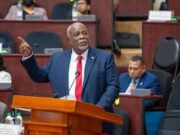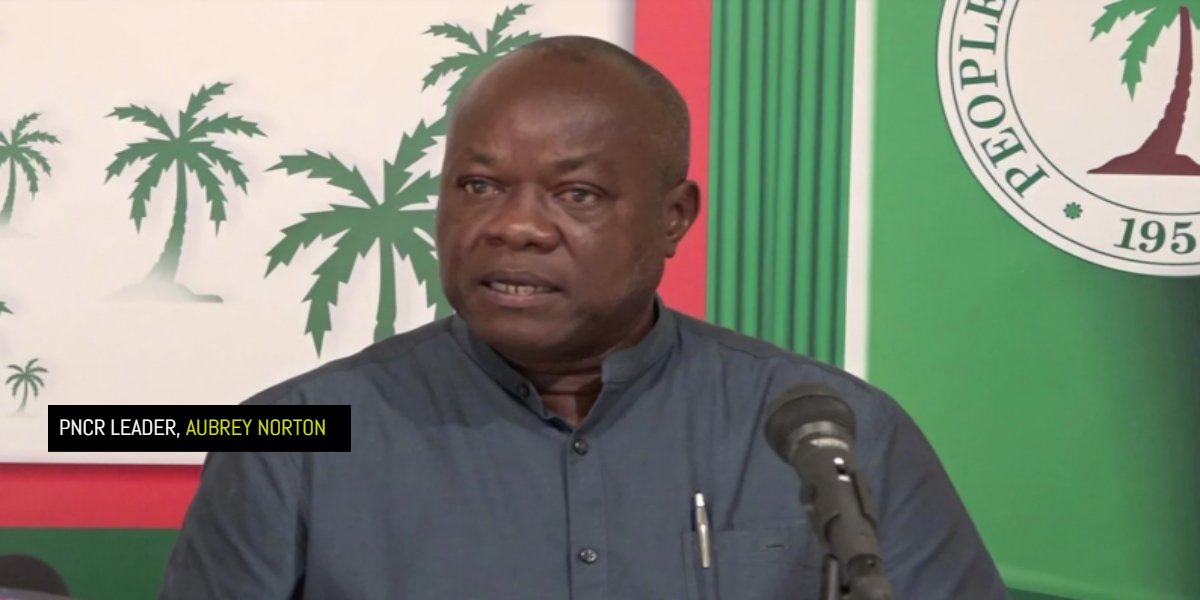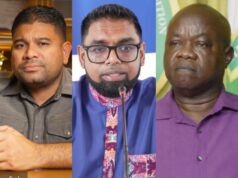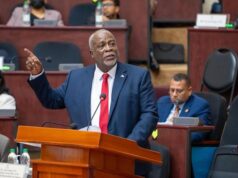
Calling it an affront to the rule of law, Guyana on Tuesday asked the International Court of Justice (ICJ) to issue five provisional measures to block Venezuela’s planned referendum and uphold the rule of law.
This was confirmed by Guyana’s legal team, led by Advisor on Borders and Agent in the case, Carl Greenidge, as public hearings began early Tuesday morning at the (ICJ).
Guyana has requested five provisional measures, to remain in effect until the court passes its judgment in the overarching border controversy case. The requested measures submitted to the court for consideration are:
1. Venezuela shall not proceed with a consultative referendum planned for 3 December 2023 in its present form;
2. In particular, Venezuela shall not include the First, Third, or Fifth questions in the Consultative Referendum;
3. Nor shall Venezuela include within the “Consultative Referendum” planned, or any other public referendum, any question encroaching upon the legal issues to be determined by the court in its judgment on the merits, including (but not limited to:
(a) the legal validity and binding effect of the 1899 Award;
(b) sovereignty over the territory between the Essequibo River, and the boundary established by the 1899 Award and the 1905 Agreement; and
(c) the purported creation for the State of ‘_Guayana Esequiba’_ and any associated measures, including the granting of Venezuelan citizenship and national identity cards”.
1. Venezuela shall not take any actions that are intended to prepare or allow the exercise of sovereignty or _de facto_ control over any territory that was awarded to British Guyana in the 1899 Arbitral Award.
2. Venezuela shall refrain from any action which might aggravate or extend the dispute before the Court or make it more difficult to resolve.
Venezuela’s National Assembly recently proposed five questions that it wishes to put before the people of Venezuela through a referendum. The first, third, and fifth questions in the planned referendum, seek to gain support for a series of actions, which include the definitive and final rejection of the 1899 arbitral award, the annexation of the Essequibo region, and its incorporation into Venezuela as a new Venezuelan state, and the granting of Venezuelan citizenship and national identity cards to the population.
In his opening remarks, Greenidge restated that Guyana is committed to maintaining peace in resolving the controversy, adding that Venezuela’s referendum seeks to usurp the court’s authority.
“For Guyana, the international rule of law is sacrosanct, and respect for it is indispensable to international peace and security. The referendum Venezuela has scheduled for December 3 2023 is designed to obtain an overwhelming popular mandate for the government to reject the jurisdiction of the court to pre-empt a future judgment of the court and in so doing undermine the authority and effectiveness of the principal judicial organ of the United Nations.
“It is a refusal to accept the court as the means of settlement of the dispute concerning the validity of the 1899 Arbitral Award and [the] related question of the determination of the land boundary between Guyana and Venezuela,” he told ICJ President Judge Joan E. Donoghue and other judges.
A few days ago, Guyana’s National Assembly unanimously passed a motion reaffirming the nation’s sovereignty and territorial integrity, and condemning Venezuela’s referendum.
The passage of this motion followed extensive meetings between His Excellency, Dr Mohamed Irfaan Ali and the Opposition Leader, Aubrey Norton, as the government and the opposition present a united front on an issue of national importance.
In 2018, Guyana submitted an application to the ICJ, seeking that the court confirm the legal validity and binding effect of the 1899 Arbitral Award regarding the boundary between the then British Guiana and the United States of Venezuela. This application also sought to affirm that the 1899 award was a “full, perfect, and final settlement” of all questions related to determining the boundary lines between the colony of British Guiana and Venezuela.
The hearing continues tomorrow, November 15. (Department of Public Information)












